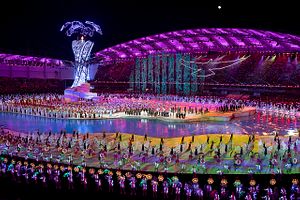China concluded its hosting of the seventh iteration of the Military World Games in late October in Wuhan. “This is a grand event of honor. Every athlete has shown toughness, challenged limits and demonstrated the spirits of contemporary soldiers,” said Vice Premier Sun Chunlan, chairwoman of the 2019 Military World Games organizing committee. The event marked China’s first hosting of the military games, while it has previously performed well in the competition, having won the most medals in the competition in 2003 at the Catania Games.
Hervé Piccirillo, president of the International Military Sports Council (CISM), praised the infrastructure, venues, and mobilization required to host the games. He also stated that the games were a positive step toward bringing people together and that sports can send a “message of peace and sharing.”
“‘Friends through sports’ is no longer just a slogan but a common goal of military sports,” he added.
The Military World Games are held every four years, the year preceding the Olympics, and put on by the CISM and a host country. The CISM has 136 members and represents the world’s second largest multi-sport organization after the International Olympic Committee. The inaugural games were held in Rome in 1995 and previous iterations have been held in Zagreb, Croatia; Catania, Italy; Hyderabad, India; Rio de Janeiro, Brazil; and Mungyeong, South Korea. A Winter edition of the games kicked off in 2010 and were last held in 2017 in Sochi, Russia. The games are held for military athletes to compete in dozens of sporting events like archery, basketball, parachuting, sailing, and swimming, as well as select military sports such as the naval pentathlon. The winter editions primarily include a variety of skiing events.
This past October at the Wuhan Games, more than 9,000 athletes from over 100 countries competed in more than 27 sports, a record number of participants. This year’s games also presented a number of other firsts: the first time the games were staged outside of military bases, the first time the games were all held in the same city, the first time an Athletes’ Village was constructed, the first time TV and VR systems were powered by 5G telecom technology, and the first use of all-round volunteer services for each delegation.
Despite these lauded firsts, the games were not without controversy. A Chinese team was suspended from its own games and their results voided in the middle-distance orienteering competition for what was called “extensive cheating.” Chinese athletes had placed first, second, and fourth in the women’s competition and second in the men’s race. National teams from six European countries (Austria, Belgium, France, Poland, Russia, and Switzerland) issued complaints to judges who discovered that local spectators had assisted the Chinese athletes. The assistance included “placing markings and preparing special paths in terrain” that only the Chinese competitors had knowledge of. The incident likely displeased high-level leadership. Chinese media focused instead on its teams’ victories, including in the naval pentathlon.
Sports diplomacy seems to have become a preferred tool of China in its pursuit of improving its global standing and public diplomacy, although its success is not guaranteed. Beijing’s hosting of the Summer Olympic Games in 2008 has often been referred to as China’s coming out party, drawing more than 6.5 million tourists according to official statistics. However, there were ongoing limits on in-country internet access and some protests at the time relating to Tibet. Beijing will also host the Winter Games in 2022. China has also historically wielded sports exchanges to diffuse and transcend tension with the United States, particularly with its high-profile ping-pong diplomacy.
Although China took home the top number of medals with 239 in the 2019 Military World Games, such events do not automatically translate to diplomatic success and public diplomacy gains. Moreover, these large-scale events are not purely rooted in building confidence and promoting friendship and peace, despite the public discourse. China was able to showcase its infrastructure and technological prowess, particularly as competition and controversy over 5G heats up. And as much as China seeks to orchestrate its hosting, it simultaneously invites opportunity for additional scrutiny and opens the potential for things running off script – with the middle-distance orienteering debacle as exhibit A.
In the short term, cheating on a public sporting stage may generate embarrasssment, but over time, China is likely to learn from these instances and adapt. Military games of this variety may seem like mere shows but they still retain value from the people-to-people exchanges to the more material demonstrations of capabilities that host states can stage.













